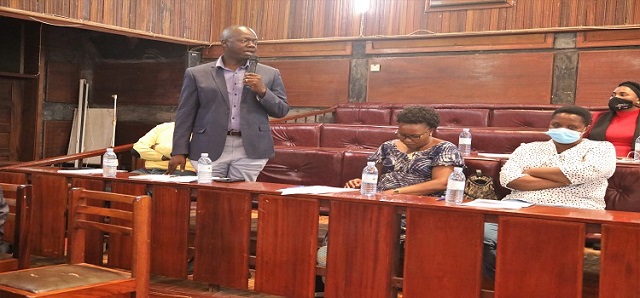
Mpigi, Uganda | THE INDEPENDENT | Farmers in Mpigi district have not made use of the six year World Bank funded, Agriculture Cluster Development Project (ACDP) which is in its completion stage.
The discovery was made by Members of Parliament on the Committee on National Economy during an oversight visit in Mpigi on Monday, 14 March 2022.
MPs observed that farmers’ groups had stores but without the produce to substantiate the reports of increased production earlier provided to the committee by district leaders.
This prompted MPs while interacting with Buganga Tulibumu Development Co-operative Society Ltd, to demand for documentary evidence of the sales made or at least any leftovers of the maize claimed to have been sold in March but farmers had nothing to present.
“We are not comfortable with their reports; they say they have sold their produce but the ware house is empty with no signs of having had anything,” said Robert Migadde, Vice-chairperson, Committee of National Economy.
In some farmers’ groups, MPs could not validate the reports on improved value addition as they discovered that a number of maize mills provided under the project have been left unutilized due to weak or no electricity connection.
“We have come across a number of groups which are actually not processing because they do not have power; this is a big problem which is affecting value addition,” Migadde said.
Migadde proposed to government to consider alternative sources of power to enable farmers add value to what they produce.
Through the ACDP, government provides 67 per cent of investment required by a farmer group while farmers contribute 33 per cent. The government contribution is directed to provision of subsidised agricultural inputs, grading of non-tarmacked roads connecting farms to the markets, provision of machinery and construction of stores among others.
The committee learnt from farmers of their plight with Mpigi district leaders who they accuse for ‘meddling in their ‘business’ with an intent to swindle funds from government.
Pauline Kyaka Kemirembe, Lyantonde district MP was concerned on learning that even when it came to construction of the warehouse, the district manipulated the farmer group into buying almost all the materials.
“The farmers almost bought everything from stones, bricks, sand, timber and they said they fed all workers, so the money from government bought only iron sheets, cleared labour and a few other products,” said Kemirembe.
Migadde who was also the team lead asked the Deputy Resident District Commissioner, Hellen Nsereko to record a statement from farmers which the committee will base on to follow up.
Nyabushozi County MP, Wilson Kajwengye called on Mpigi district leadership to come up with a plan to sustain farmer groups in business even when the funding in no more. He cited rain water harvesting and preservation of fertilizers as one of the ways farmer groups would be supported to continue in commercial farming.
“It is good you have realised that heavy reliance on rain for agriculture is no longer tenable; I can tell you it is not only in Mpigi but the entire country. As a district, what plans have you put in place to harvest rain water and use it for agriculture?” asked Kajwengye.
On the increasing cost of fertilizers, Kajwengye said the prices are likely to shoot up saying the world’s biggest supplier of fertilizers, Russia is engaged in war.
“I can tell you that since Russia is the biggest supplier of fertilizers and now with the war it is in, by next year a sack of fertilizers will most likely hit shs500,000. We need to preserve our own fertilizers of coffee husks and others so that we don’t rely on imported fertilizers,” said Kajwengye.
The ACDP is a six year project implemented by Ministry of Agriculture, Animal Industry and Fisheries with a loan of US$ 150 million from the World Bank. The project which is expected to close in 2022 aims at increasing on-farm productivity and marketable volumes of selected crops in 57 districts.
*****
SOURCE: UGANDA PARLIAMENT MEDIA
 The Independent Uganda: You get the Truth we Pay the Price
The Independent Uganda: You get the Truth we Pay the Price



